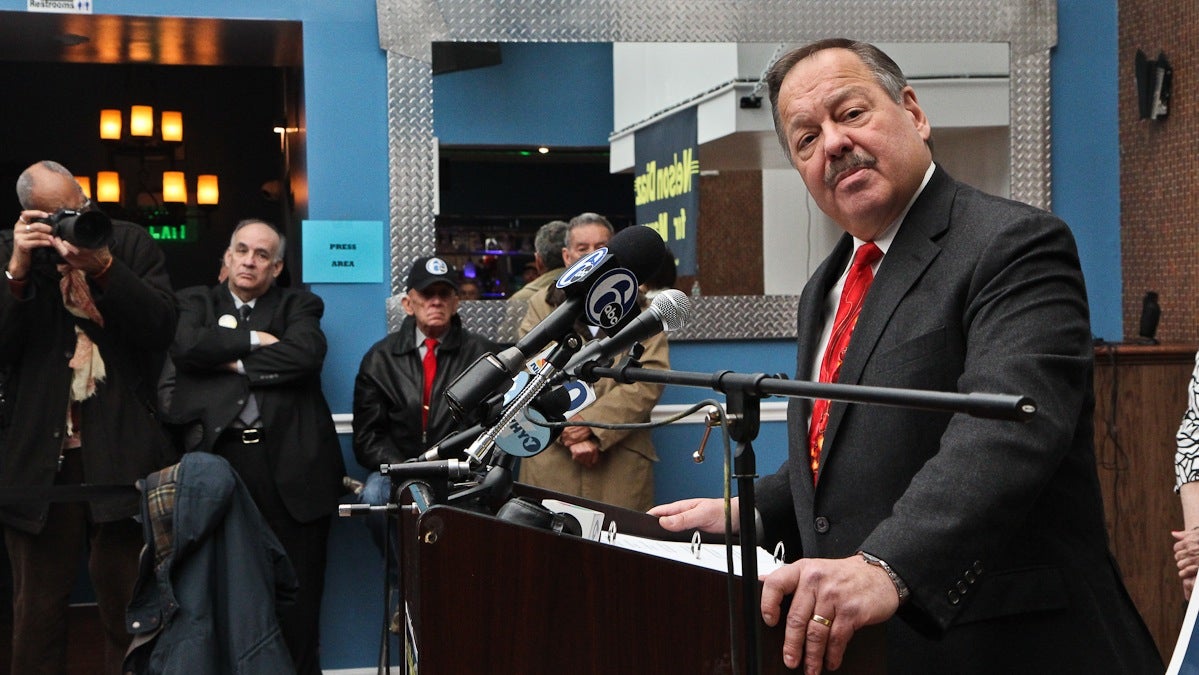Diaz passionate, but is he serious?

Former Philadelphia City Solicitor Judge Nelson Diaz announces his candidacy for mayor of Philadelphia to supporters Thursday. (Kimberly Paynter/WHYY)
Like lot of people, when I heard months back that former judge Nelson Diaz was planning to run for mayor, I had a hard time taking it seriously.
Diaz has been around a long time and is known to insiders, but is hardly a prominent public figure. He pops up on Sunday morning TV now and then commenting on the issues of the day.
But he’s never been elected to anything but a judgeship, and his roles in government have been behind the scenes – city solicitor for Mayor John Street, general counsel to HUD under President Bill Clinton.
But when Diaz made his formal announcement Thursday, it was a real event. Held in North Philadelphia at the Tierra Colombiana restaurant, it drew more than a hundred people, including many recognizable figures from the city’s Latino community and beyond.
There were ministers, a couple of ward leaders, union executives, and former elected officials, among them one-time state lawmaker and populist firebrand Ralph Acosta. And there was former City Councilman Angel Ortiz, who told me when I asked for his thoughts that Diaz for mayor was more or less his idea.
“I called Nelson up,” Ortiz said. “I said somebody from the progressive side should be a candidate for mayor. I said, ‘Nelson, you can do it. You’ve got the name. You’ve got the background.'”
That was more than a year ago, Ortiz said. Diaz was resistant, but he eventually came around.
Can he win?
Diaz starts with support in the city’s Latino community, a group that’s growing demographically but has historically under-performed at the polls. There’s also another Hispanic candidate, Ken Trujillo, in the race.
Ortiz said that Diaz will get the bulk of the Latino vote in part because his background is Puerto Rican, while Trujillo is a Mexican-American from the Southwest.
“There are over 110,000 registered voters with Hispanic surnames, and 85 percent of them, I believe, are Puerto Rican,” Ortiz said. “If that community votes at a greater percentage than 12 percent, you get real numbers.”
But Diaz will have to get plenty of votes beyond his base, and he says he’s done enough good work in Asian, African-American and white communities to be known and trusted there.
In conversations I’ve had about Diaz, I find some regard him as a reliable ally of progressives, but not someone known to get a lot done. I’m sure we’ll learn more about his past work as the campaign unfolds.
But he begins the race with very low name recognition, and getting known in the four months he has before the primary is likely to cost some serious cash.
The Inquirer’s Chris Hepp asked Diaz if he could raise the money he’d need.
“I think if we make the issue about money, then you’re back into special interest groups,” Diaz said. He said the election ought to be about who has the ideas and experience the city needs, and that is part of the media’s responsibility.
He’s right, of course – it is our responsibility to report on issues and qualifications. But in the real world, media coverage alone is rarely enough to give a little-known candidate what he needs to win.
Diaz may be able to tap fundraising sources beyond the city to some effect. He told me had a fundraiser in Puerto Rico in December. But he’s starting late, and it may be a tough hill to climb.
Diaz has a professional campaign manager, Ian Rivera, who is young but has some experience in politics. He’ll be a busy man.
Should he win?
Diaz has an appealing life story. He grew up poor in Harlem. His mom was a seamstress, his step-dad a doorman. He got an education and made Philadelphia his home, becoming the first Puerto Rican to graduate from Temple law school and the first Latino judge in Pennsylvania.
He’s held some important jobs, and says he’s accomplished a lot in them.
Diaz spoke with conviction about making the schools work, citing well-worn statistics about how much more Lower Merion spends per child than Philadelphia, and ways in which city students are deprived.
“It is awful, it is criminal what we’re doing to our kids,” Diaz told reporters after his formal announcement. “And the reason I’m in this race — because you know I can do a lot of other things — are ,one, I know I can win, and, two, I’m going to fix the school system no matter what. I will die fixing those school systems!”
Diaz spoke about starting universal prekindergarten, establishing after-school programs, and giving teachers the respect they deserve.
But, in all he said, I heard nothing new about the critical matter of finding reliable funding for the city’s schools.
Diaz said on his first day in office, he’d meet with the governor, the City Council president, and the leader of the teachers union, “and the four of us should sit down and figure out how we’re going to educate our children.”
Diaz isn’t alone among the mayoral candidates in not presenting a convincing argument that he can reform the system and fund the schools. but he isn’t distinguishing himself in that respect either.
As with all the candidates, we have to hear more.
By the way, our senior education reporter Kevin McCorry recently grilled the candidates on a very specific question: how should the school district respond to the 40 new charter school applications before it now? Read and hear his story here.
WHYY is your source for fact-based, in-depth journalism and information. As a nonprofit organization, we rely on financial support from readers like you. Please give today.


